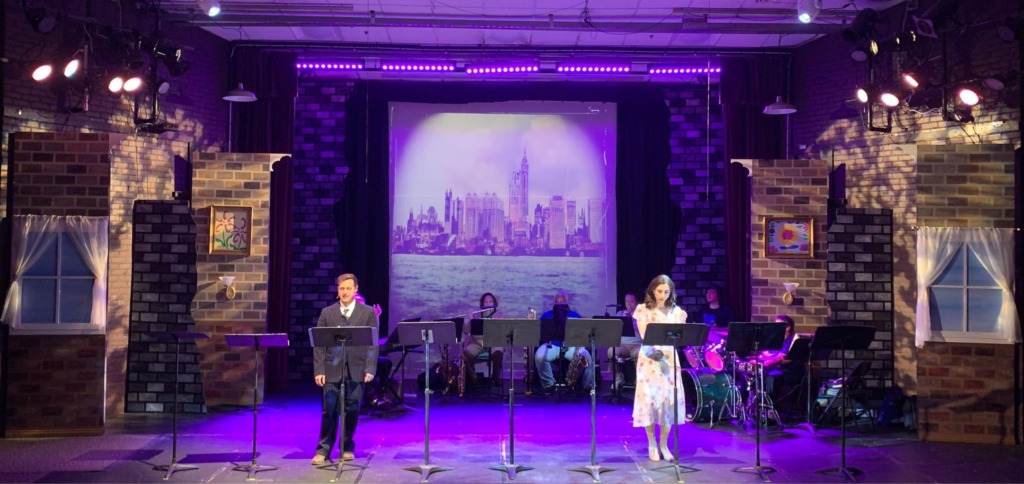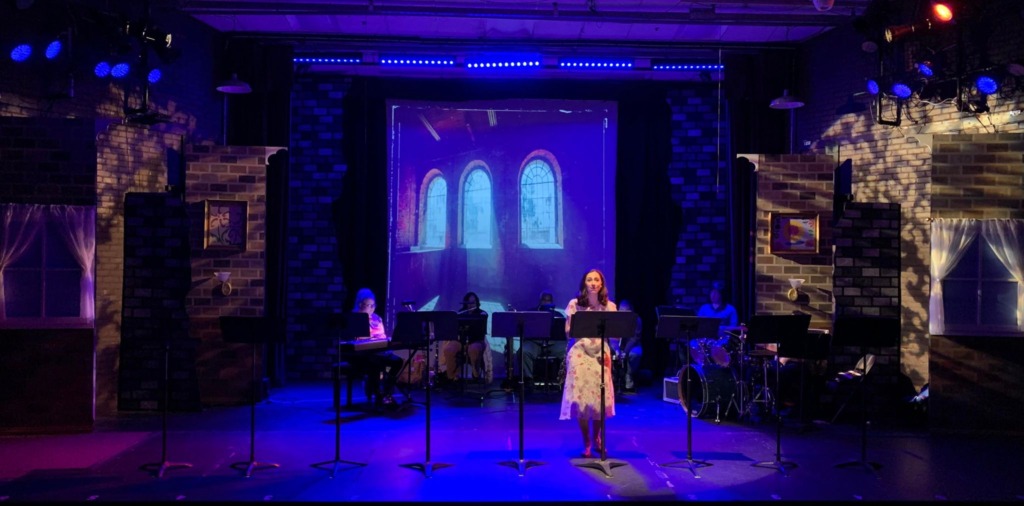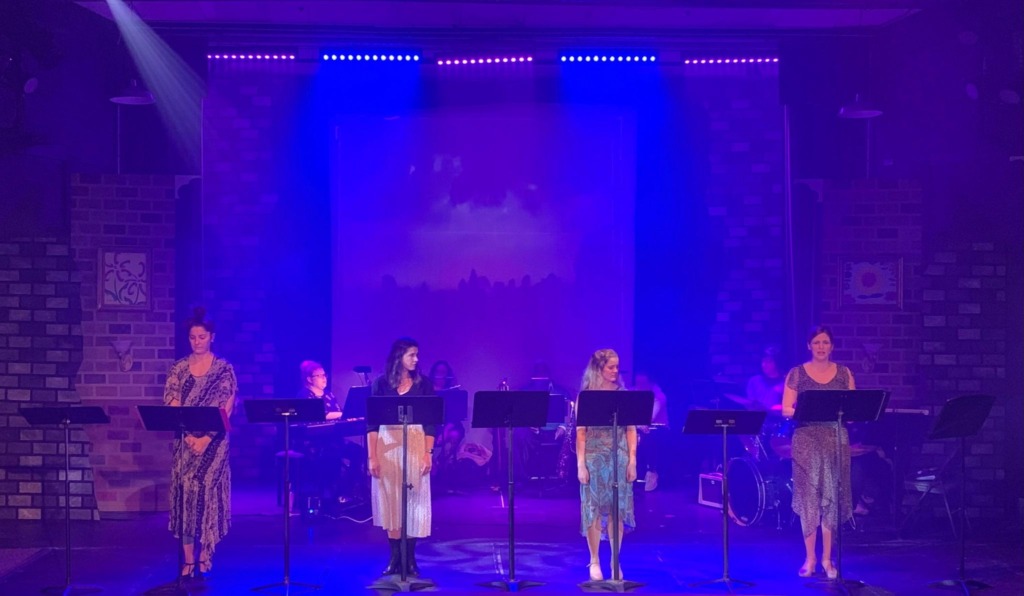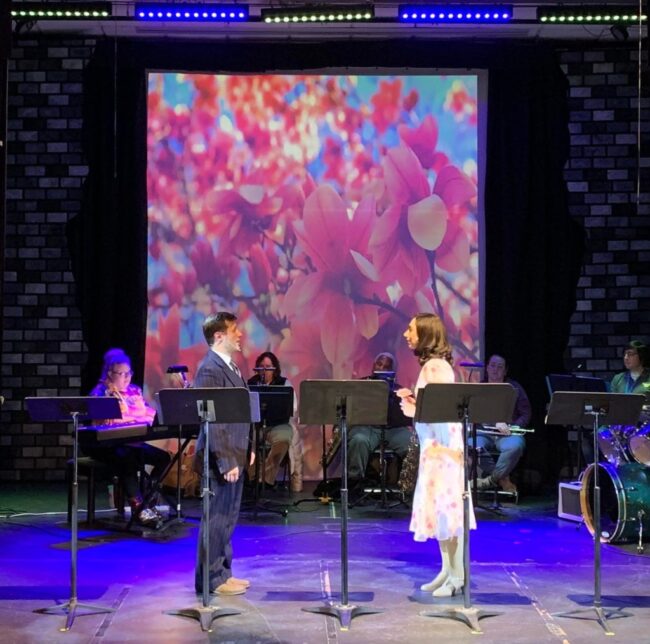Dazzling.
In a word. To add another, dizzying and astonishing, though technically that’s two. As a writer I often find it a challenge, though one I’m ready to embrace, to put the right words to paper (digital though it may be in this day and age) in order to describe an experience, relate a situation, review a performance. I cannot recall a time in recent memory (even before the Pandemic) where such a challenge befell me and I was honestly at a loss for words. The script is compelling, the music disorienting, the story both historical and true. The talent? Immeasurable. The feat itself indescribable. And the man orchestrating it all seems unbelievable; how does one young man, of just 18 years of age, pull together something that feels as if it’s been years in the making, with the area’s finest talents, and present it with such aplomb that the audience is stunned into a standing ovation? That’s a question, dear readers, that you can only answer by attending the second of two performances of Zelda: The Musical, a staged concert at CCBC Essex. If there is one complaint about this production its that it is only running for two performances and that it is restricted by the confines of being a staged concert. With Music & Lyrics by Les Reed & Roger Cook and Book by Kit Hesketh Harvey (with additional material by Laurence Myers and Sammy Jungwirth), Zelda is truly a once-in-a-lifetime experience not to be missed.

Directed by the inconceivably talented Sammy Jungwirth with Musical Direction by Charlotte Evans Crowley, this American debut of Zelda: The Musical is a striking tale that’s rooted in the reality of America’s past. Zelda Fitzgerald and her tragic story, however dramatized for the sake of being a stage musical, are real. She was a person, these events did happen. The show itself is dark though not without its humors, has eerily beautiful and haunting music, not dissimilar to something along the lines of Phantom of the Opera, and the rendition that Sammy Jungwirth, the talented team of one dozen performers he has assembled, and the creative team (Jungwirth, Crowley, Ed Lake— Lighting, Robyn Alvarez— Costumes, Diane M. Smith— Technical Director, Margie Lake— Stage Manager) puts forth on the stage is nothing short of astonishing.
One of the primary challenges that any director faces when mounting a staged concert is whether or not (and if so, how much) of a technical-creative component to include in the production. Jungwirth’s vision included simple flanking scenic flats, music stands, and projections on the background screen (against which the live six-piece orchestra is set.) The images flashing on the screen fit sublimely with the action of the story as it evolves; whether it’s stained-glass windows to showcase the cathedral for the wedding or the harrowing corridor of the sanitorium; the projected imagery is subtle but highly effective. Ed Lake’s lighting is a critical component to understanding the complexity of the story’s shifting narrative; Zelda is a musical told in memory and often has jarring moments where the titular character is ripped from her recollective reverie with nothing but words from another character and the sharp and striking contrast of the lights. Lake makes use of a great deal of stage haze and blue light to depict certain emotions, augmenting the pathos of a great many of the more harrowing musical numbers.
Sammy Jungwirth finds the balance of his vision for this production in the costumes as well. Of the era— the roaring and fashionable twenties— but of the past. Jungwirth and Robyn Alvarez keep everyone in the production in a monochromatic scheme of black, white, and gray. Much like the infinite symbolism in F. Scott Fitzgerald’s writing, this black and white approach gives vibrancy to the title character as she is the only one to appear in colors (with the exception of her daughter, who wears a radiant blue and brown patterned dress…as she is the only bright-spot in Zelda’s existence at the time.) The primary dress given to Zelda, one of faded pastel flowers, represents the struggle of her bright personality constantly being dampened by her family, her husband, her circumstance, and society as a whole.
The score is an immensely dizzying dervish that is both cacophonous and beautiful. Musical Director Charlotte Evans Crowley and her Zelda-Orchestra (Crowley on piano and conducting, with Jarrett Rettman on keyboard 2, Helen Schlaich on reed1, Darwin Ray on reed2, Casey Novak on trumpet, and Lisa Wood on percussion) bring this vastly complex score to vivacious life. The style of Les Reed and Roger Cook’s music nearly defies description; it’s part distorted carnival calliope, part high-Broadway, part roaring 20’s jazz, part ballad, part demented nightmare, and all tragically beautiful. Crowley and the orchestra bring the vocalizations of the musical numbers an unparalleled radiance. The score is enough to cross the eyes permanently and it vexes the mind to think on how many hours of painstaking rehearsal must have passed to have both orchestra and performers delivering it in as pristine a condition as they did.

Despite the scaled back nature of a staged concert, the audience is treated to a glorious spectacle. Sammy Jungwirth has ensured that it is more than just one dozen performers at music stands singing and reading lines. These are highly developed, dynamic characters on display with real moments of conflict, of passion, and of interaction. There are often fully staged productions that don’t achieve this level of concrete character development and narrative storytelling. Jungwirth has cultivated something extraordinary and unique with this production. One of the most striking moments of harrowing beauty that will truly eviscerate the heart is the ‘invisible waltz’ shared between Zelda and Scott during “Even Now.”
The dozen performers— Hannah Elliott, Bella Comotto, Rob Tucker, Tatiana Dalton, Ava Correlli, Darren McDonnell, Amy Luchey, Anthony Case, Beverly Serio Edwards, J Purnell Hargrove, Jamin Mears, Rachel Verhaaren— are some of the area’s most talented performers, some with many decades of experience, others young rising stars on the scene, but all come together divinely in this staged concert production, lending their enthusiasm for the project as well as their impressive talents, both musically and with their character portrayals, to create an all-encompassing experience for the audience. Beverly Serio Edwards, for instance, is both nurse and nanny (one for Zelda’s present and one for the passing of time in Zelda’s memory) and flips from stoic to quirky humor on a dime. Edwards gives the audience all the laughs with her little zinger about Clark Gable. Under Jungwirth’s superbly honed direction, the fine comic nuance of a great many scenes (mostly in the first act of the show) lands easily in the audience and laughter, despite the dark nature of said humor, is plentiful.
You get brief glimpses at some of these characters, like J Purnell Hargrove’s Dexter, a suitor who sorely dislikes being a displaced landing strip for Zelda’s affections while she awaits her true interests, in the form of Scott Fitzgerald, far away from Alabama in New York. Hargrove’s facial expressions and simple gestures with his fedora make for an engaging characterization for an otherwise easily overlooked minor role. Amy Luchey’s Lois is another such character, though she is given a partial song to fully showcase her talents. The smug and confident Lois Graham, actress to be marveled, belts her way through the absurd number “The Queen of Babylon” (a send-up to the old Hollywood movie-musicals if ever there was one) and puts her vocals on display for all to enjoy.
Darren McDonnell, first as Judge Sayre and alter as Ernest Hemmingway, brings a powerful presence to the stage in both roles, though drastically different in his delivery of each. While his beautifully conditioned voice is a stellar addition to the extraordinary cast, it’s his bombastic nature as Judge Sayre, in that thick, syrupy Alabama accent, that draws the eye. The sheer force of stubborn traditionalism that McDonnell augments in this character portrayal is beyond praiseworthy. He creates a sharp contrast when performing as the more mellow Hemmingway in the second act. Jamin Mears, who appears in the ensemble but also as Eduard, is similar to McDonnell in his command of stage presence though his character’s feature aligns more closely with that of Lois as he is given a feature song to showcase his talents. “The Old World Shines Again” is a crashing carnival of musical complexity which Mears soars through with flying colors, delivering an inferno of a start and again at each verse, while mellowing into something more subdued for the chorus of the song. His vocal sustain at the end of that number is of knockout quality.
While neither the character of Maxwell, the publishing agent and general attaché of the Fitzgerald couple, or the character of Dr. Myers, overseeing Zelda’s psychological care in the sanitorium, are given songs of their own to explore the character’s rich inner life, Anthony Case— playing both— ensures that the audience experiences both of these men as wholly developed entities. It’s a simple thing, shifting his tone of voice, pulling his hair up as the doctor and letting down as Max, but these subtle shifts indicate clear divides between the pair of people. Dr. Myers often appears suddenly— ripping Zelda out of her recollective reverie— his posture rigid and unyielding as if to represent that reality itself is austere and unbendable.

Cheeky and chipper, though nowhere near the degree of her ‘baby sister Zelda’, Rosalind (Ava Correlli) is a character who drifts in and out of Zelda’s life as it evolves. Correlli understands the nuance of her character, particularly when adding biting humor of the nasty kind to moments early on in the show. Her voice is glorious and pairs well with both Zelda and Tatiana Dalton, playing Minnie (Zelda and Rosalind’s mother) in “Refuse to Be a Girl.” You can hear Correlli’s vocal brilliance again towards the end of the production, alongside Dalton and Luchey in the number “Being a Woman.” Tatiana Dalton, who gives Minnie as much ‘free spirit’ as her restrictive husband will allow, pours loving light into every moment she shares with Zelda on the stage. There is something unquestionably maternal present in those moments, even when the moments are dark and difficult. With an effortless voice that commands the ear of the audience, Dalton navigates the impossibility that is the roving score of “Being a Woman” before being joined by the two aforementioned women for that number.
Flouncing with a feathery skip in her step onto the stage as Young Zelda, Bella Comotto matches gesture and vocal felicity to her grown-up namesake during “I’m Dancing.” And while Comotto quickly disappears thereafter, fret not, her talents reappear in the second act, guised as Scottie, the daughter of Zelda and Scott. Her emotional outcry, particularly in moments shared with Zelda at the sanitorium is gut-wrenching; you can feel her heartache. The way she interacts with both Scott and Zelda feels genuine, even in more difficult moments where the harsh realities of being a child of a convoluted and borderline-broken home become an undeniable reality.
Mastering the vocally complex role of F. Scott Fitzgerald with an insanely enchant charm, Rob Tucker waltzes maddeningly in and out of favor with the audience. His vocal talent is second only to that of Hannah Elliot (playing the title role) in the production and what he achieves from a character development standpoint seems unimaginable in such a truncated span of time. Gleaming with the elation of ‘love at first sight’, Tucker doesn’t just sing “Beautiful Magnolia”, he transports the audience to that sultry Alabama night beneath the glowing moon so much so you can almost smell the magnolia blossoms on the breeze. His voice is haunting and captivating and disturbingly beautiful, which makes the horrific scene close to the end of the performance truly breathtaking in the most abjectly terrifying way possible. Tucker shifts from romantic charmer to gaslighting monster and you cannot look away. The vocal versatility that Tucker showcases throughout the performance is awe-inspiring, and the dynamic and powerful sustain achieved at the end of “Tender is The Night” is beyond what one can pen in words.

Hannah Elliot is blinding in the role of Zelda. Dazzling. Daring. Delectable. She gives an award-winning performance (if there were awards for two-night-only staged-concert versions of highly-underrated musicals.) From the moment you see her, the madness that runs through her is so strong you lean back in your seats for fear that it might be catching. Everything from her accent and spoken cadence to her facial expressions with every shifting emotion is raw and yet simultaneously refined. Her mercurial performance from start to finish is phenomenal. It cannot be said enough times how truly disorienting the music of Zelda is but Elliot mellifluously drifts through it as if she were born singing it. Emotionally intense and with a myriad of pathos being expressed in a fathomless cauldron of experiences, Elliot doesn’t breathe life into Zelda or wear her like a second skin, she simply is Zelda Fitzgerald, madcap, desperate, alive, delighted and delusional all at once. The sassy and radiant nature that she foists into “No One Can Figure” is as emphatic as the broken heartache that she gingerly pours into “Save Me The Waltz.” When Elliot takes up the song “Golden Days” never is it more clear that the deep and harrowing trauma of her life has set her on this path to mental instability; the song is brutal and Elliot makes it beautiful.
While the legends themselves— Zelda Fitzgerald and F. Scott Fitzgerald— will live on infinitely because their stories are not easily forgotten, this stupendous production of Zelda: The Musical will only live on— like the good moments in Zelda’s life— in memory; do not miss this rare and unique opportunity to see extraordinary talent do something beyond incredible.
Running Time: Approximately 2 hours with one intermission
Zelda: The Musical a staged concert, plays January 20th & 21st 2023 in the Lecture Hall of the Administration Building at the Community College of Baltimore County Essex Campus— 7201 Rossville Boulevard in Baltimore, MD. Tickets are available at the door or in advance online.
